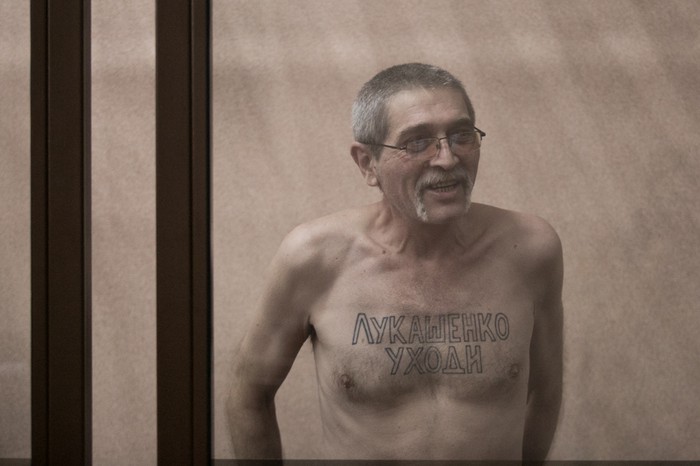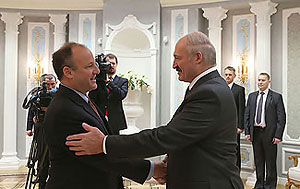Political Prisoners – No Longer a Sticking Point in Belarus-EU Relations?

Photo: freedomhouse.org
This May, the Belarusian authorities increased pressure on a number of political prisoners, including former presidential candidate Mikalaj Statkievič, anarchist Mikalaj Dziadok and political activist Jury Rubcoŭ.
This move appears unreasonable when set against a backdrop of improving relations with the West, as the political prisoners issue has always been a major contributing factor in western policy towards Belarus. However, in recent months, an unheard of number of Western officials have visited Minsk, and few, if any, raised much of an alarm about the human rights situation.
The reason for their conduct is, clearly, a result of the regions' profoundly changed geopolitical landscape. The growing concerns surrounding the Ukraine conflict and Belarus' position on Crimea's annexation and peacemaking efforts are pushing the West to change their strategy towards Minsk.
Isolation is giving way to strengthening Belarusian independence in order to weaken Russian influence in the region. Still, western negotiators should be careful not to remove human rights issues from the agenda, while acknowledging that talking to Minsk requires some delicacy.
Growing Pressure on Political Prisoners
On 5 May the court of the Škloŭ colony ordered Mikalaj Statkievič to be transfer into a prison for the rest of his time in confinement for breaking the terms of his imprisonment. Mikalaj Statkievič, a famous Belarusian politician, is serving a six-year term in prison for leading the 2010 street protests that opposed the results of the presidential election. He is the only former presidential candidate still in prison, and continuously refuses to sign an appeal for a pardon to Lukashenka, an position that seriously irritates the authorities.

On 20 May, another political prisoner, Mikalaj Dziadok deliberately injured himself protesting against harsh conditions in the penal ward. However, after receiving medical aid he was sent back to the ward. Mikalaj was one of the anarchists imprisoned by the authorities for allegedly attacking state buildings and private institutions in 2011.
On 28 May, the Pružany district court sentenced Jury Rubcoŭ to two years in prison for evading compulsory work, which he was originally sentenced to serve out in an probationary correctional facility. Rubcoŭ found the wages for jobs the administration assigned him to be too low and demanded the average Belarusian salary. He was serving a 1.5 year term for insulting a judge during an administrative trial after a Čarnobyl Way annual protest gathering.
Who is (and Who is not) a Political Prisoner in Belarus
Currently, Belarusian human rights groups, the International Federation for Human Rights and Freedom House list six political prisoners in Belarus. Four of them, Ihar Alinievič, Jaŭhien Vaśkovič, Mikalaj Dziadok, Arciom Prakapenka, were tried in 2011 under the so-called “anarchist trial” and sentenced to 4.5-8 years in prison. They are accused of attacking banks and casinos, as well as a KGB office in Babrujsk. As for the cases of Jaŭhien Vaśkovič and Arciom Prakapenka, Belarusian human rights groups accept that certain laws were broken, but say their prison terms are excessive.
However, earlier this spring the head of Latvian Foreign Ministry Andrejs Pildegovičs stated that the EU officially only recognises three political prisoners: Ihar Alinievič, Mikalaj Dziadok, and Mikalaj Statkievič. In other words, the EU apparently accept, more or less, the validity of the the charges against the remaining three anarchists as well as Jury Rubcoŭ.
Moreover, authoritative international groups Amnesty International recognised only Mikalaj Statkievič and Jury Rubcoŭ as "prisoners of conscience". Meanwhile, Minsk continues to insist that there are no political prisoners in Belarus, and those whom human rights groups call political prisoners are serving fair sentences for specific criminal offences.
Lukashenka's Prisoner Dilemma
Political prisoners are now a part of the Belarusian electoral cycle, with each of the two last presidential campaigns in 2006 and 2010, as each were accompanied by the imprisonment of activists and opposition figures. By doing so, they demonstrate their control over what is considered politically acceptable in Belarus.
At the same time, political prisoners have been the chief obstacle in developing relations with the West, which thus far have set a proper human rights record as a necessary pre-condition of any improvement of relations. As Polish Foreign Minister Radoslaw Sikorski stated at a EU foreign ministers meeting in 2011, "the liberation and rehabilitation — their participation in politics — of all political prisoners in Belarus is a prerequisite for our resumption of dialogue with authorities in Belarus". Consequently, Lukashenka sought to find a balance between demonstrating his firm grip on the domestic situation, all while maintaining some degree of cooperation with the West.
The image of a dictator holding people in prison for political reasons, in Belarus' case, continues to damage the investment attractiveness. It damages any real potential economic cooperation with western countries, to say nothing of securing loans from international financial institutions like the IMF. Moreover, Lukashenka is now in dire need of a counterbalancing force to overwhelming Russian influence in Belarus if he is to retain his ability to independently make decisions. Although he tries to find it elsewhere in the world, Europe and the US certainly remain major actors in the game.
Lukashenka sees bowing to demands to release the prisoners, sees as humiliation. Perhaps he hopes that the growing security threats in the region may help him build relations with the West without releasing political prisoners.
Hostages of the Ukraine Crisis?

In recent months, Minsk has hosted unusually large number of western officials, including the Deputy Secretary General of the European External Action Service Helga Schmid, Commissioner for European Neighbourhood Policy and Enlargement Negotiations Johannes Hahn, PACE special rapporteur on Belarus Andrea Rigoni, and US Department of State representative Eric Rubin.
In their meetings with Lukashenka and other Belarusian senior officials, they have largely discussed Ukraine and appear to have shelved any serious discussion on human rights issues in Belarus. Minsk's peacemaking efforts in the Ukraine conflict and its refusal to support Crimea's annexation, by all apperances, have proven to be of greater importance to the West.
As Eric Rubin stated, “In our view, support for Belarusian independence, economic growth and trade do not contradict the issues where we have disagreements”. This new approach allows for limited cooperation in a de-politicised manner that seek to strengthen Belarus' independence and, consequently, weaken Russia's influence on its neighbours.
While the West does still recognise the political prisoner problem in Belarus, it has assigned it to the competency of a sovereign state to deal with. This limited cooperation suits Minsk well. It has no interest in adopting European political models and norms, and can benefit from other forms of cooperation with the West, especially those that can nudge Russia towards new concessions with energy and loans. By taking the political prisoner issue of their foreign affairs agendas, even temporarily, is precisely what Minsk has been yearning for for years.
While it may make cooperation between the West and Belarus easier and could potentially lead to deeper engagement between them, the issue of political prisoners should not be set aside. This requires a delicate balance of diplomacy and determination by western officials in their dealings with Minsk.




